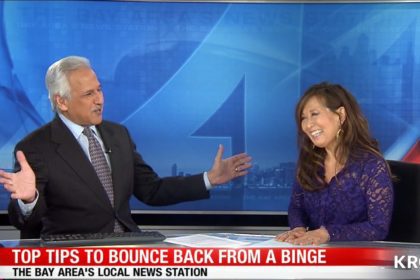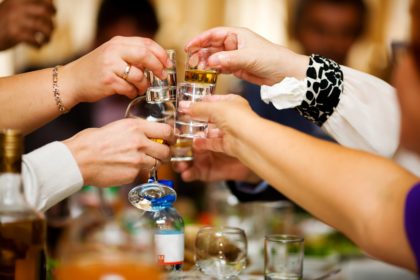Overeating and over-drinking during the holidays may be a relatively acceptable practice, but there are other reasons that people eat and drink, and not all of them are happy. For many, holidays are a time of loneliness and stress. Here are my Do’s and Don’ts to help cope with seasonal overindulgence.
How can one avoid “drowning their sorrows” in alcohol or comfort food? The office party is not for everyone. Being forced to mingle with co-workers can be a source of anxiety for some. Same goes for socializing with seldom-seem relatives. Also, people are feeling pressured to buy gifts when they’re struggling to pay bills and rent.
The Do’s and Don’ts for Managing Overindulgence
Holiday time is an emotional time. While food fuels your muscles, it also feeds your feelings.
1. DO recognize “emotional” eating and drinking.
What is emotional eating?
- When eating is triggered by an emotion rather than physical hunger.
- Emotional eating strikes suddenly and you crave a specific food, such as a “comfort food”, which is generally very sweet or high in fat.
- Dealing with a multitude of emotional eating triggers will drive you to desire comfort. It’s a typical response to stress, which results in you craving your favorite childhood foods, a.k.a. “nostalgic eating”.
What is emotional drinking?
- Emotional drinking is the practice of using alcohol as a coping tool to soothe difficult emotions.
- Similar to the same concept as emotional eating where you overindulge in comfort foods or sugary treats to NUMB your pain.
- Whether you’re indulging in food or alcohol, both can lead to health and social problems.
Why do people eat and drink emotionally?
- Alcohol is a depressant (functions to slow down the central nervous system), that might make you feel calmer and more relaxed AT FIRST, but when you stop drinking and the effects of alcohol wear off, it can heighten any feelings of anxiety, guilt, or shame.
- Drinking also reduces inhibition, judgment, and memory, so alcohol becomes a way to distance yourself from stressors or challenges that you may be facing.
- Oftentimes, grabbing a drink is easier than dealing with something you don’t know how or don’t want to handle. Same with emotional eating. Grabbing a comfort food like a bag of chips is a lot easier than identifying and dealing with a underlying problem as well.
- Continued avoidance of life’ challenges and the lack of healthy coping mechanisms can lead to addictive drinking and eating.
Who uses food and alcohol as a coping mechanism?
Are you…
- Stressed by a heavy load at work?
- Overwhelmed by social anxiety in college?
- Suffering from PTSD as a Veteran?
- Have a family history of alcoholism or food addiction?
The only way to stop stress eating and stress drinking is to first recognize that you’re doing it.
NOTE: As I mentioned in my last segment, when a person is under stress and their stress hormones are elevated, they are 5X more likely to die from a heart attack, stroke, or other cardiovascular causes.
2. DO cope with alcohol and food “hangxiety”.
Some people experience psychological symptoms, such as feeling anxious or depressed, the morning after drinking — this is known colloquially as “HANGXIETY”.
- Most people are familiar with the physical symptoms associated with drinking and a hangover (headaches, upset stomach, disturbed sleep, dehydration, and low blood sugar), but don’t realize they can all contribute to anxiety and depression. Often times, these psychological effects are just as hard to deal with for drinkers.
- If you’re uncomfortable in social situations (social anxiety), you may be tempted to use alcohol to feel more confident or relaxed. In that case, hanganxiety can be particularly problematic because once the alcohol wears off, your anxiety can often be worse than before and harder to deal with than the physical symptoms of the hangover.
The best way to avoid hangaxiety is to not drink.
“Food Hangovers”
Food hangovers can occur the next morning after eating too much fat, meat, sugar, salt, and spice, and the symptoms can be similar to drinking too much alcohol. Classic food hangover symptoms include:
- Nausea
- Sluggishness
- Heartburn
- Feeling of heaviness
- Bloating
- Dehydration
- Headaches
- Stomach upset
What to Eat During Recovery
The fiber in the fruits and veggies will add bulk to your stool, and move it through your digestive tract and out of your body much faster. Include foods, such as:
- Fruit and vegetable smoothie with 1-2 tablespoons of ground flaxseed like my Kale Fruit Smoothie, Pumpkin Pineapple Smoothie, or SPA (Spinach Peach Apple) Smoothie.
- Vegetable soup, such as my Roasted Kabocha Apple Soup or a butternut squash soup.
3. DON’T associate drinking and eating with relaxing and feeling better.
- Explore other ways to help you unwind.
- Breathing exercises, like the 4-7-8 breathing technique, can be effective. It can stimulate the vagus nerve is used to reduce anxiety.
- Exercise or go for a walk. Exercise releases the “happy hormones”, so it can help de-stress and lift your mood. Connecting with nature for 20 minutes has been shown to initiate relaxation.
4. DON’T skip the “dress rehearsal”. Be ready with a “prepared script” if you know you’ll be facing “food or booze pushers” at the next gathering as they are typically very insistent.
Think of it as you would a job interview. You have a prepared script for anticipated questions and comments. Same for holiday parties and gatherings.
- When faced with feeling obligated to taste or have “one more bite” or “one more drink” of something you’d rather not consume, kindly decline with a smile and firm “no, thank you” without any explanation.
- If that doesn’t work after several times, you can also say you’d love to try it later as it looks delicious then quickly change the subject, or grab some other guest and enthusiastically suggest they try it, then slip away.
- When people try to push food, drink, or their bad habits on you during the holiday season, consider their motivation for doing so. Sometimes friends or family members express their love through food that they’ve prepared and/or want to shower you with attention. Be appreciative rather than annoyed.
![]() Karen’s Fit Tip: Be sure to arrange your world for success. This is the critical action step in taking control over your goals. It’s just like you wouldn’t have cigarettes around your house if you were trying to quit smoking.
Karen’s Fit Tip: Be sure to arrange your world for success. This is the critical action step in taking control over your goals. It’s just like you wouldn’t have cigarettes around your house if you were trying to quit smoking.
If you are determined to stop drinking, then arranging your world for success would involve:
- Removing all reminders of your addiction from your home and workplace (e.g., alcohol, bottle openers, wine glasses, and corkscrews). The same goes for binge foods.
- Separating from those who would encourage you to be involved with the very item you’re trying to avoid.
- Not letting other people use or bring reminders of the addiction-related substance or behavior into your home.





